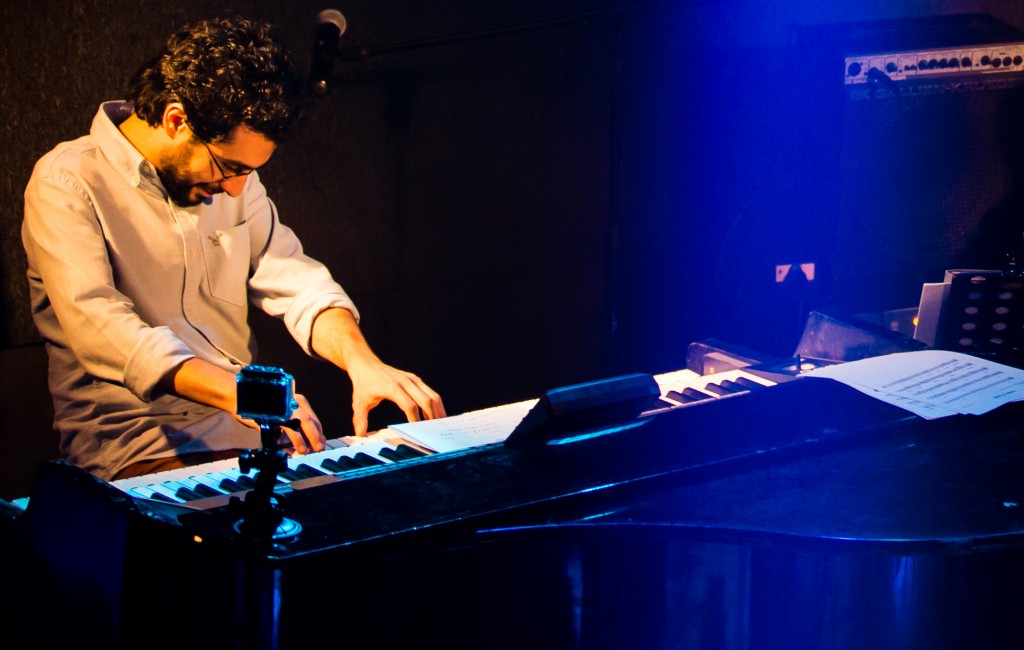Tarek Yamani
A new approach to jazz
Tarek Yamani. © Archives Tarek Yamani
Tarek Yamani is a Lebanese, Arabic, international artist … I am all three at once, even if I do not like categorization in terms of identity. Belonging is a complex phenomenon. Most people feel they belong to the country where they were born and grew up, even if they have never left their locality. Their belonging is limited to their city, their families and their language, and not to their country as an entity. As an artist in general and musician in particular, the concept of belonging has a different idiom. Music is a language that transcends human differences. This is the basic tool of expression and communication that can transform the definition in mission. However if it is imperative to define myself, I will say that I am a pianist and composer of jazz and Afro-Tarab of Beirut.
You presented at the Music Hall, Beirut Speaks Jazz, with 16 artists. Is this a premiere? And why did you choose Beirut? This is actually the third edition of this concert, Beirut Speaks Jazz. I had the idea in 2013 and I am fully satisfied with the way in which the concept has developed. Initially, the aim was to make jazz closest to the public, since this art is largely misunderstood in Lebanon. We had to find an innovative idea that can attract and guarantee the attention and interest of the audience. The concept is simple: each year, I invite artists who have distinguished themselves in rock, rap, hip-hop, tarab and blues, to come sing a song on a jazz arrangement. As simple as it seems, the idea has many advantages: it brings together fans of all genres under one umbrella, namely jazz; it strengthens the spirit of cooperation between artists who otherwise would not have had the opportunity to perform together on one stage; it presents jazz as a form of art that defies genres and limitations. Result? The artists of Beirut Speaks Jazz evolving on Beirut musical scene, express themselves only in jazz, during the same evening, an original and unusual spectacle.
What characterizes your performance? Beirut Speaks Jazz is an outstanding performance similar to none in the Arab world, spontaneous and stimulating. It stimulates our musical potential and extends it to untapped areas, creating an interaction with the public. That’s the reason why the three editions were a huge success. 37 artists express themselves in jazz, like Oumeima El Khalil, Tania Saleh, Hamed Sinno, Wassim Bou Malham, Poly, Aziza, Ranine Chaar, Rayes Bek, Edd Abbas, Issa Ghandour, Chady Nashef, Mazen El Sayed, Ziad Ahmadieh …
«In my new album, I will try to introduce the Arabic «quartertone» in my music and merge it with the melodies and jazz rhythms.»
Do you think jazz is known in Lebanon? Still not enough. Jazz is much better but not enough to be considered as known. It is misunderstood and subject to false assumptions in Lebanon. The one known by the public is old fashioned and superficial, so no wonder it is not appreciated. Today, the conception of jazz is modern and sensational. That’s what I try to communicate through my performance as Tarek Yamani Trio, and beyond through Beirut Speaks Jazz.
What are your future projects? Regardless of the new concepts introduced by Beirut Speaks Jazz, I continue to work on the album «Lisan Al Tarab: Jazz Conceptions in Classical Arabic» which explores the relationship between Arabic music and jazz. I will try to introduce the Arabic «quarter-tone» in my music and merge it with the melodies and jazz rhythms.
Tell us about your album … In «Lisan Al Tarab» I revisit the classical Arab music by introducing new arrangements of jazz for piano, bass and drum. I recorded Egyptian «Muwashahat» such «Hibbi Zürni» and «Lamma Bada Yatathanna», Lebanese songs like «Beirut Zahra fi Gheir awanha», another traditional from Iraq and the famous folk song of Bilad Al Sham, «Ah YaZein».
What would you say then? I would like to invite the public to explore, at least out of curiosity, different emerging arts. Being part of a living spectacle and experiencing this energy, is unmatched. With the increase of public demand for art, artists creation will get stronger; the greater the creation, the competition will get fierce; more competition, will make the level higher and better; and when the level is high, culture will be richer.
For more information: www.tarekyamani.com
email: [email protected]






